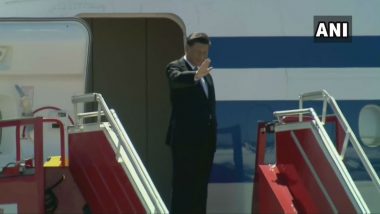New Delhi, June 24: Amid ideological crackdowns on ethnic and religious minorities, the Chinese Communist Party (CCP) gears up to celebrate the centenary of its birth on July 1 by unleashing a blizzard of propaganda material emphasising the continued relevance of the party and communism.
For President Xi Jinping and his hardline supporters in the party, the occasion comes as a much-awaited diversion from burning issues like ethnic strife, the COVID-19 pandemic-induced economic disparities and rising unemployment, pro-democracy demands in Hong Kong and voices for independence in Taiwan, apart from growing criticism from a multitude of neighbours involved in territorial disputes with China. China City of Guangzhou Deploys 60 Drones to Keep People Indoors After New COVID-19 Ceases Reported
The authoritarian CCP is ready to take formal credit for China's present standing as the world's manufacturing hub, the world's second largest economy and a geo-political prominence backed by a nuclear arsenal and expansionist belligerence.
The propaganda material of the party, however, glosses over the negative distinctions the CCP accrued over the better part of the century.
The CCP has ordered installation of giant billboards painted red with the number 100 and the communist hammer and sickle emblem across the cities and towns. The slogan that glares from every shop window reads: "Listen to the party, appreciate the party, follow the party."
The message about the pre-eminence of party in the lives of the people comes out loud and clear.
The face of President Xi from equally imposing banners lets none in doubt about the only goal of the Chinese goal: His 'Chinese Dream'. The third image that no citizen ever forgets also flutters from every nook and corner: Soldiers of the People's Liberation Army in uniform. Digital screens in bright red dish out the following text: "Raise a new generation of spirited, capable, courageous and morally upright revolutionary soldiers."
In the run-up to the celebrations, the CCP has authorised a nation-wide propaganda schedule. It calls every cinema house in China to promote at least two propaganda films per week until the end of 2021. Nearly 5,000 theatres that are part of the National Alliance of Arthouse Cinemas, a party outfit, will be dedicated to screening only propaganda films five days a week.
The directives were made official recently by the National Film Administration and the powerful Propaganda Department, calling on the country's entertainment industry to ensure, as an official statement said, that "film authorities in every province, region and municipality, every film and cinema company and every production firm" will screen and promote "outstanding films" on the greatness and contributions of the CCP. The films have a single objective, to "eulogize the Party, the motherland, its people and its heroes".
The authorities have decided that a batch of 12 films will be screened repeatedly in the cinema houses. They are: "Fighting North and South (1952)," "Railway Guerrilla (1956)," "Battle on Shangganling Mountain (1956)," "The Red Detachment of Women (1960)," "Red Sun (1963)," "Zhang Ga the Soldier Boy (1963)," "Heroic Sons and Daughters (1964)," "The Nanchang Uprising (1981)," "Hundred Regiments Offensive (2015)," "Battle of Xiangjiang River (2016)," "The Sacrifice (2020)". The last one is a new release, "Landmine Warfare".
The party has also ordered that apart from screening these films, the entertainment industry should primarily promote the "Xi Jinping Thought" and warned that the cinema houses should guarantee not only the screening, but also the full attendance for every show.
Major General Li Jun, assistant to the director of the CCP Political Work Department, has quoted as saying that certain films highlighting the heroics of the Chinese military would also be shown to the people as these films will "build a strong atmosphere of listening to the Party's command and striving to strengthen the army".
The propaganda blitz in China today reminds one of how throughout the CCP's turbulent history propaganda has been its chief weapon to hide its inadequacies and brutal policies from the people.
The latest bout of propaganda showed President Xi as the "saviour" of the country even as the Chinese suffered from the Coronovarius pandemic, lost their jobs, were reduced to penury and the world heaped blame on the CCP leadership and Xi for the outbreak of the virus.
The Chinese Foreign Office took to the social media throughout last year in protecting President Xi and the CCP from any blame over the virus. They tried to control public opinion and created larger-than-life images of the leaders who they said were fighting to save the Chinese masses from the virus.
Last month, the CCP came up with a white paper on Tibet in face of growing unrest in the autonomous region and growing global criticism about the plight of Tibetans. The white paper talked about how in 1951 "with the peaceful liberation of Tibet, the people of Tibet broke free from the fetters of invading imperialism for good, embarking on a bright road of unity, progress and development with all the other ethnic groups in China".
The white paper made it appear that the Tibetans gladly entered into a mutually beneficial agreement with China. The paper concluded: "In the new era, under the strong leadership of the Communist Party of China Central Committee with Xi Jinping at the core and with the vigorous support of the whole country, Tibet has made new progress in various fields, including eradicating extreme poverty, a brand new socialist Tibet has taken shape."
Recalling how Chaiman Mao Zedong tried to relaunch himself by using propaganda after the failure of the Great leap Forward, Tenzin Tsultrim, a visiting fellow of Tibet Policy Institute, a research centre of the Central Tibetan Administration, wrote recently about the amount of propaganda before the centenary celebrations: "The peddling of the Party's anniversary may be accompanied with portrayals of Xi Jinping as a savior, because the Covid-19 pandemic has severely dented the image of China under President Xi. One may expect speeches by Xi on his plan to reinvigorate the 'Chinese Dream', thereby entrenching his own dream to remain in power for life."
(The above story first appeared on LatestLY on Jun 24, 2021 05:25 PM IST. For more news and updates on politics, world, sports, entertainment and lifestyle, log on to our website latestly.com).













 Quickly
Quickly


